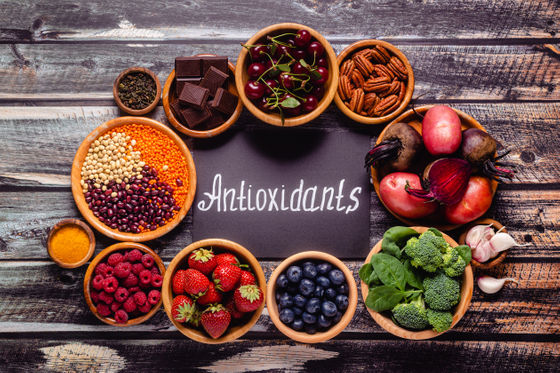Experts say that free radicals, which cause cancer and aging, are good for health in small amounts, and what is the right balance between antioxidants and free radicals?

Antioxidants, such as vitamin C, vitamin E, and polyphenols found in grapes, fight against
Is it possible to have too many antioxidants? | Live Science
https://www.livescience.com/health/food-diet/is-it-possible-to-have-too-many-antioxidants
◆What are the risks of antioxidants?
Previous research has found that people who include antioxidant-rich fruits and vegetables in their diets have a lower risk of premature death from all causes of death, including cardiovascular disease and cancer. It's natural to think that consuming more substances is a good thing.
However, there are risks to taking too many antioxidants, especially from supplements. A well-known mild side effect is that the skin turns yellow or orange due to beta-carotene intake. Also, high intakes of vitamin C can cause digestive problems such as diarrhea, nausea, and abdominal pain.

On the other hand, serious side effects can occur when people who are already at high risk for lung cancer or cardiovascular disease, such as smokers, ex-smokers, or people who have inhaled asbestos, take high doses of beta-carotene. It has been reported that there may be an increased risk.
Additionally, multiple studies using mouse body tissues have shown that antioxidants can promote tumor growth and metastasis. 'This suggests that people with high levels of antioxidants should avoid taking antioxidant supplements,' the researchers noted .
◆Role of free radicals
One of the reasons why excessive intake of antioxidants is bad for the body is thought to be that it suppresses the beneficial effects of free radicals. Specifically, low concentrations of free radicals are said to support cell growth and exert beneficial effects on immune function, and are also involved in drug metabolism and decomposition, as well as communication between cells. .

``There is a lot of evidence that free radicals play a beneficial role in physiological processes,'' Ismail Raha, a professor of pharmacology at the University of British Columbia, told the science news site Live Science. . ``Consuming too many antioxidants can interfere with normal and essential processes, which can have undesirable consequences,'' said James Koehler of the University of New Mexico School of Pharmacy.
◆How to balance antioxidants and free radicals?
When asked, ``So how can you enjoy the benefits of antioxidants while avoiding the disadvantages of overdosing them?'' Koehler says it all comes down to eating a balanced diet and not relying on supplements. Masu.
'Eating a balanced diet with sufficient amounts of fruits and vegetables will provide you with adequate amounts of antioxidants. Unless you have a long-term poor diet or have a specific disease, , dietary supplements are rarely needed,” Koehler said.
According to Laher, exercise is also important. Free radicals are generated when you exercise, but muscles, heart, and liver have the ability to produce antioxidants, which can suppress the generation and negative effects of free radicals.

If you're thinking about taking antioxidant supplements, experts advise talking to your health care professional. As mentioned above, consuming the wrong amount of antioxidants can actually harm your health, and if you are taking medications, they may interact with them, changing their effects and side effects. .
In addition to antioxidants, the phenomenon in which a substance is beneficial at low doses but harmful at high doses is called `` hormesis, '' and a typical example is oxygen, which is necessary for breathing.
'Just because a little is good for you doesn't mean more is better,' Koehler said.
Related Posts:







